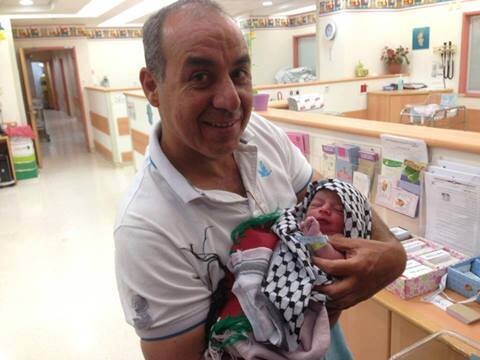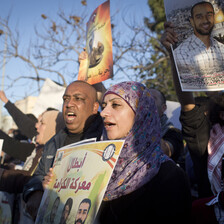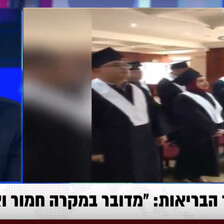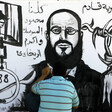The Electronic Intifada Jerusalem 8 September 2014

An image circulated on Facebook shows Nasser Abed Rabbo holding his first-born son, Amir. Once again behind bars, he has yet to meet his son Ali, born in August.
Little Amir was sleeping in his mother’s lap. His first birthday had recently been celebrated and he had started walking. His mother was expecting to give birth to another son within a few weeks. Strong winds blew outside but otherwise it had been a quiet night. But not for long.
In the early hours of that morning on 18 June, Amir’s father, Nasser Abed Rabbo, was kidnapped by Israeli soldiers. Masked and heavily armed, the soldiers broke into his family’s home after they had stormed the Sur Baher area of occupied East Jerusalem.
Abed Rabbo had previously spent 24 years behind Israeli bars; he was sentenced by a civilian court to life in prison after being charged with leading an armed resistance cell. His sentence was later commuted to 38 years and he was eventually released as part of a prisoner exchange deal struck between Israel and Hamas in October 2011.
“At 2:55am we saw dozens of masked soldiers approaching our home. They started knocking at the door with their feet and rifles. Nasser knew they had come here for him so he asked me to hide his phone for fear it would be confiscated,” Abed Rabbo’s wife, Fatima, told The Electronic Intifada.
“They dragged Nasser, who was in his pajamas. Nasser resisted and pushed them away from me. I quickly brought him some clothes and shoes to wear,” she added.
“One soldier told me in Arabic, don’t worry, we are just taking him for interrogation and he will return soon. They then handcuffed and blindfolded him. Nasser’s mother, who lives next to us, started screaming. She is 85 and has become all too familiar with such scenes.”
Nasser Abed Rabbo has still not returned home.
Attorney general’s order
Abed Rabbo was one of seven Jerusalemites released under the 2011 agreement who were re-arrested that same night.
The other six are Ismail Hijazi, Adnan Maragha, Alaa Bazian, Jamal Abu Saleh, Rajab al-Tahan and Ibrahim Mishaal.
At the time of his arrest, Maragha’s wife was due to give birth to their first child within two months; meanwhile, Bazian had previously spent thirty years in Israeli jails, losing his sight completely in 1979.
Yehuda Weinstein, Israel’s attorney general, issued a request to re-incarcerate all seven Jerusalemites on 24 June, the Israeli daily Haaretz reported.
The Israeli authorities used the disappearance of three Israeli teenagers in the occupied West Bank that month as a pretext to round up hundreds of Palestinians. Prisoners who had been released after the 2011 deal were particularly targeted.
Across Jerusalem and the wider West Bank, 51 Palestinians who had been released under that deal were re-arrested on 18 June.
In total, 131 of the 824 prisoners released to the West Bank (including Jerusalem) as part of the deal have been re-arrested, Haaretz reported on 23 June. Israel has accused these Palestinians of violating the terms of their release and most are awaiting trial in military courts; sixty-one of them face completion of their original sentences, according to the Palestinian Prisoners Club.
Palestinians released to Jerusalem following the 2011 deal have been prohibited from traveling elsewhere in the occupied West Bank or abroad. They have been ordered to report monthly to the police station based in the Russian Compound area of Jerusalem.
Secret evidence
On 15 July, a committee appointed by the Israeli parliament, the Knesset, to examine alleged violations of the prisoner exchange deal decided that six of the seven Jerusalemites re-arrested in June should complete their previous life sentences. Only Ibrahim Mishaal was released, according to the Samidoun Prisoners Solidarity Support Network.
Based in Haifa, the committee is headed by a former judge and includes representatives of the Israel Prison Service.
“The committee charged them with returning to ‘terrorist activity,’ membership in terrorist organizations and other violations of the terms of the deal,” said Ramzi Kteilat, the prisoners’ attorney.
“The decision was taken based on secret evidence presented by the public prosecution and intelligence services that neither the lawyers nor the prisoners were allowed access to,” he added.
“How can you possibly repudiate their claims if we don’t even know the exact charges against them or the evidence used against them? This decision is in flagrant violation of the prisoners’ right to due process.”
The six are scheduled to appear for a hearing in Nazareth’s District Court on 2 October. Fatima, Nasser Abed Rabbo’s wife, is awaiting that hearing with trepidation.
“We don’t know what to expect and this is perhaps the worst part about it. Their arrest is purely political and our greatest concern is that the decision of the committee will be upheld,” she said.
“Ibrahim Mishaal’s release gave us a glimmer of hope but it was soon extinguished. I expect Nasser’s release at any moment but I also fear the worse. This unpredictability hurts.”
Despite her anguish, Fatima grinned while recalling a conversation she had with Nasser a few weeks before she gave birth to their new son.
“He called me while in prison, with a mobile phone that was smuggled to the prisoners and later confiscated by the prison guards, and asked, how’s Ali doing? I asked him, who’s Ali? He said he would like to call the baby Ali.”
Ali was born on 3 August, a few hours after Fatima returned from a visit to Nasser in Gilboa prison.
“I started feeling pain when I was visiting him,” she said. He told me, I’m sure you’ll give birth today. I laughed and said that I’m not due until 10 August, but he was right.
“I went into labor when I was on my way back from the prison. My brother was with me, but I desperately wanted Nasser to be with us. He couldn’t be there with me; he couldn’t hold his second child. All we could do is send him pictures of the newborn baby through friends who are visiting the prison.”
Taste of freedom
Nasser was twenty years old when he was arrested in February 1988. Since his release, he had been trying to build a new life.
He had married Fatima, his neighbor, soon afterwards. They had “the best possible honeymoon,” she said.
“We went to Haifa, the occupied Golan, Jaffa … Nasser especially loved Jaffa. One of his cellmates who spent 29 years in Israeli occupation jails is from Jaffa and we regularly visited him after his release.
“He [Nasser] loved spending hours at the beach. Now that he has finally tasted freedom after 24 years of imprisonment, he’s suddenly back to being behind bars, not knowing if and when he’ll be out again.”
Fatima does not expect justice from Israel’s courts. But she is determined not to lose hope. She is finding solace in the mutual support from the mothers and wives of the other prisoners.
“We share so much in common,” she said. “Our partners have all spent more than twenty years in jail, they were released together and re-arrested together. We draw strength from each other.”
Budour Youssef Hassan is a Palestinian anarchist and law graduate based in occupied Jerusalem. She can be followed on Twitter: @Budour48.





